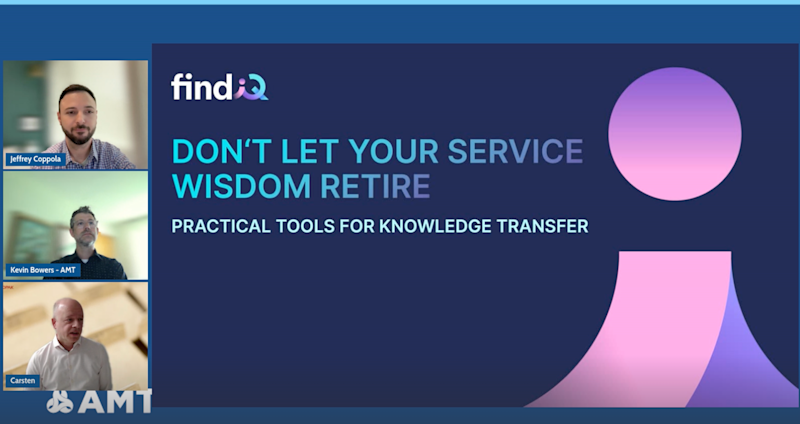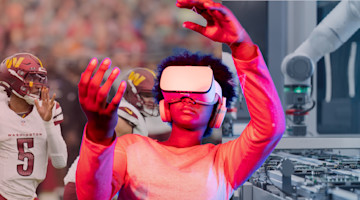As manufacturing evolves, companies look for ways to preserve the service knowledge of experienced technicians before they retire. In ��ɫ��Ƶ – The Association For Manufacturing ��ɫ��Ƶ’s recent webinar, “,” sponsored by , we explored how structured knowledge management and model-based AI-powered tools can lock in that expertise and make it accessible to every technician.
Why Knowledge Transfer Can’t Wait
Jeffrey Coppola, head of growth at findIQ in the United States, shared data underscoring the urgency. By 2030, the United States is expected to lose approximately 640,000 experienced technicians, while 86% of Gen Z workers say they would not enter the field. This shift has implications not only for staffing but also for service efficiency and operational continuity.
Unplanned machine downtime remains costly, potentially up to $250,000 per hour, yet many manufacturers rely heavily on informal, experience-based troubleshooting. Formalized knowledge is no longer optional. Coppola emphasized that datasets alone are not knowledge; knowledge is the interpretation of data by individuals with relevant experience.
FindIQ’s Digital Service Expert system integrates knowledge management with model-based AI, which differs from a large language model (LLM) such as ChatGPT or CoPilot. For example, LLMs use large datasets to predict language patterns, can return different answers each time, may produce fake answers, and need 20,000 feedback loops to learn.
In contrast, model-based AI relies on predefined structures and expert-built cause/symptom logic trees. It delivers repeatable outcomes, validates troubleshooting paths, shows how decisions are made, and typically requires only 20 feedback loops to learn.
Model-based AI is a far more precise and predictive methodology because it is based on real-world user experience.
“Our goal is to provide reliability, clarity, and performance in real-world service environments where accuracy matters more than creativity,” says Coppola. “We want to mimic how expert technicians revise beliefs based on new symptoms.”
FindIQ incorporates the U.S. Air Force OODA loop – observe, orient, decide, act – a decision-making framework designed to help pilots act quickly under uncertainty when they do not have all the information.
A Practical Example
Carsten Werheit, director of service development and excellence at , outlined how his team implemented findIQ’s Digital Service Expert system to capture and share field service knowledge, empower less experienced technicians, and create a centralized knowledge database:
“Our machines are quite complex and require a lot of experience to handle and solve issues. Our challenge was that less experienced field service engineers (FSEs) often struggled to solve problems efficiently, had to call more experienced FSEs, and lacked access to a centralized knowledge database. We needed to capture the expertise of the experienced FSEs and make it available to all of them globally.”
Elopak focused initially on two types of filling machines and organized structured workshops to gather insights from experienced technicians and engineers.
FindIQ’s solution captured the nuanced understanding that Elopak’s experienced FSEs possessed – knowledge that traditional reports often failed to transfer. The platform enabled accurate troubleshooting workflows, reduced reliance on individual expertise, and supported global service operations while accelerating learning for new FSEs.
The resulting knowledge base helped reduce machine downtime and provided a repeatable framework to support less experienced technicians.
4 Steps to Turn Knowledge Into Action
Define who needs what knowledge and in which situations. Clarity drives the right tool choice.
Start small. Focus on one machine family, a common problem area, or your most troublesome machine. (You only need one knowledge carrier, one inexperienced user, and one initial use case to get started.)
Secure cross-functional support. Technical, operations, and change management teams must align.
Design for usability. Let technicians shape the system’s look, feel, and workflow.
AI That Supports Technicians
Coppola stressed the value of model-based AI over general-purpose AI, noting that model-based AI systems more accurately diagnose faults because they are grounded in real-user experience.
The findIQ platform is designed to be intuitive, support multiple document formats, and integrate easily into the workflows of field service teams. In addition to manuals and PDFs, findIQ allows handwritten notes and photos to be uploaded to create an initial symptom and cause matrix. FSEs add further information into the platform while in the field, so it continues to integrate new information, refine the matrix, and iterate upon it to ensure that tacit knowledge from maintenance professionals is preserved.
“Younger FSEs are used to systems like these and really appreciate the assistance when facing complex problems,” says Werheit. “Our experienced FSEs have given positive feedback and are seeing the benefit of having the knowledge collected.”
“Having findIQ is like having an experienced FSE right next to you, guiding you through the process,” says Coppola. “As FSEs use the platform and troubleshoot, it becomes more accurate at delivering consistent, repeatable outcomes and validating troubleshooting paths.”
Elopak is now moving into the second phase of the findIQ rollout, which includes additional technician-led workshops to integrate even more expert knowledge into their global service infrastructure, supporting both efficiency and continuity.
Preserve Know-How. Protect Uptime.
Knowledge management is a strategic investment. By codifying expertise and scaling it with model-based AI, manufacturers can ensure consistent service, shorten onboarding, and safeguard uptime as their workforce evolves.
How is your team preserving the wisdom of soon-to-be retired technicians? Share your strategies and lessons learned by emailing us at research@��ɫ��Ƶonline.org. Let’s keep critical know-how alive for the next generation.
Watch the now.






